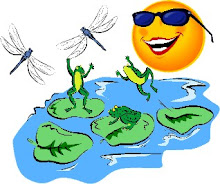
POND WEATHER PROBLEMS
We sure have had some awful weather in parts of the U.S. Here in St. Louis we have had snow about every third day for a couple of weeks and no end in sight.
That reminded me to list some of the do's and don'ts of winter weather for the garden pond:
1) If your pond is covered by snow and ice, sweep off some of the snow. The snow on top of the ice keeps the pond dark and any plants (algae is a plant) will start taking oxygen out of the water and can deprive your fish of it! !! Observe all necessary precautions not to fall in the pond!!
2) Be sure the pond is not completely frozen for any length of time (how long varies with pond size and fish population). We do not let our ponds freeze completely at all, opting instead to use de-icers to keep them open.
3) Do not beat on the ice to break it. The resulting sound waves can harm and/or kill the fish!
4) Sometimes we get sudden, very warm days. This can be a problem if the water is heated to quickly by the sun. Koi in particular are very sensitive to sudden temperature changes. If possible start a pump to help keep the water evenly heated at all layers. The pump should be about midway in the depth of the water (for example, if the pond is 3 feet deep, submerse the pump intake at about 1 1/2 feet).
Seasonal Pond Supplies
We sure have had some awful weather in parts of the U.S. Here in St. Louis we have had snow about every third day for a couple of weeks and no end in sight.
That reminded me to list some of the do's and don'ts of winter weather for the garden pond:
1) If your pond is covered by snow and ice, sweep off some of the snow. The snow on top of the ice keeps the pond dark and any plants (algae is a plant) will start taking oxygen out of the water and can deprive your fish of it! !! Observe all necessary precautions not to fall in the pond!!
2) Be sure the pond is not completely frozen for any length of time (how long varies with pond size and fish population). We do not let our ponds freeze completely at all, opting instead to use de-icers to keep them open.
3) Do not beat on the ice to break it. The resulting sound waves can harm and/or kill the fish!
4) Sometimes we get sudden, very warm days. This can be a problem if the water is heated to quickly by the sun. Koi in particular are very sensitive to sudden temperature changes. If possible start a pump to help keep the water evenly heated at all layers. The pump should be about midway in the depth of the water (for example, if the pond is 3 feet deep, submerse the pump intake at about 1 1/2 feet).
Seasonal Pond Supplies
